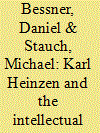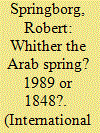| Srl | Item |
| 1 |
ID:
147236


|
|
|
|
|
| Summary/Abstract |
This article examines a neglected topic, the imposition of counterrevolution. Whereas revolution can sweep across whole regions like a tsunami, reaction tends to advance gradually, country by country. As these differences suggest, counterrevolution unfolds in a more deliberate and systematic fashion than revolution, which is fueled by the rash, ill-considered belief that the tsunami's trigger—the striking overthrow of a longstanding ruler by mass protest—is widely replicable. While reactionaries share this facile inference during the revolutionary upsurge, they engage in learning thereafter, rely less on problematic inferences, and resume more rational decision-making. Longstanding experience and practices of open debate and collective deliberation enable them to process information more thoroughly and calibrate their counterrevolutionary plans to domestic opportunities. Consequently, they succeed in reestablishing autocratic control step by step. By demonstrating how reactionaries recuperated their grasp of political reality during the upheavals of 1848, the article elucidates the differential patterns of rationality in politics.
|
|
|
|
|
|
|
|
|
|
|
|
|
|
|
|
| 2 |
ID:
095289


|
|
|
|
|
| Publication |
2010.
|
| Summary/Abstract |
Scholars have long recognized the importance of Karl Heinzen's Mord und Freiheit in the history of terrorist thought. Yet the translation most scholars have relied on-1881s Murder and Liberty-is incomplete. Our new translation reveals four elements omitted from the 1881 translation. First, Heinzen conceived of terrorism as a transnational phenomenon. Second, he provided a material justification for terrorist tactics. Third, Heinzen viewed terrorism as both a tool to impel human society to progress and as a "progressive" tool of violence. Finally, he argued in favor of the primary modern tactic of terrorism-the indiscriminate bombing of civilians.
|
|
|
|
|
|
|
|
|
|
|
|
|
|
|
|
| 3 |
ID:
108036


|
|
|
|
|
| Publication |
2011.
|
| Summary/Abstract |
Potential Arab democratic transitions will face more substantial obstacles than Eastern Europe did in 1989. Those obstacles include the intense securitisation of the Middle East, the absence of agreed upon models for future polities and economies, the residual power of authoritarian systems, and the limited capacities of newly emerging political and civil societies. Even the poster children of the Arab Spring, Tunisia and Egypt, are not well equipped to imitate the success of Eastern European countries. The Arab Spring of 2011 may thus be more akin to the 1848 failed revolutions than to the democratic transitions set in motion by the crumbling of the Soviet Union in 1989.
|
|
|
|
|
|
|
|
|
|
|
|
|
|
|
|